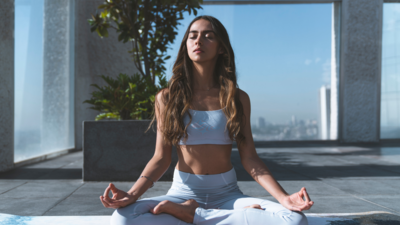ARTICLE AD BOX

If you’ve ever tried to build a meditation habit, you’ve probably asked yourself the same question everyone else does: When’s the best time to actually do this?Some people are die-hard morning meditators; they roll out of bed, sit in silence before the day begins, and swear it changes everything.
Others say evening is better than meditation is the ultimate way to wash off the stress of the day and slide into sleep.So who’s right? The truth is, there isn’t one universal answer. But mornings and evenings do offer very different experiences, and depending on your goals (and your personality), one might fit you better than the other.
The case for morning meditation
There’s something almost sacred about the early hours. The house is quiet, your phone hasn’t started buzzing yet, and the day feels like blank paper you haven’t scribbled on.
Meditating then can feel like planting a flag in your mind before the rest of the world tries to claim it.Your mind is clearer. Before emails, conversations, and deadlines pile up, you’re working with a fresher mental slate.It sets a tone. A ten-minute sit before coffee can ripple into the rest of the day. You may not notice it at first, but later, when traffic or your boss tests your patience, you respond a little differently.
It’s easier to stay consistent. Let’s be honest once your day gets moving, finding quiet time can be like chasing a unicorn. Morning gives you a reliable window.The only downside? If you’re not a morning person, the struggle is real. Dragging yourself out of bed earlier isn’t easy, and grogginess can turn “peaceful meditation” into “accidental nap.”
The case for evening meditation
Evening meditation has a different flavor. The day is behind you, your brain is buzzing with everything that happened, and meditation becomes less about preparation and more about release.It clears the clutter. You’ve probably gathered a pile of stress by evening conversations, tasks, and frustrations. Sitting quietly can feel like unpacking a heavy bag you’ve been carrying all day.Better sleep. Slowing the mind down before bed makes it easier to drift off, especially if you’re someone whose thoughts usually race at night.Space to reflect. Evenings are great for looking back on how did you handle yourself today? What can you let go of before tomorrow?The pace is slower. You’re not rushing out the door. There’s room to sink into the practice without clock-watching.The catch? Fatigue. Sometimes you’re so tired you skip it, or you sit down and find yourself dozing halfway through. And honestly, distractions like TV, family time, or your phone can easily push meditation off the list.
So which one wins?
Here’s the secret: Neither. The “best” time is the time you’ll actually do it.If your mornings are chaos with kids, traffic, or a packed routine, forcing yourself into a dawn meditation might just add stress.
If your evenings always end with you collapsing into bed, you’ll probably skip more often than not.Instead, think about what you need:Want focus, energy, and a sense of intention? Try mornings.Want release, calm, and better sleep? Try evenings.Can’t decide? Do both, but keep each session short five minutes when you wake up, five minutes before bed.
How to find your best time
You won’t really know until you experiment. Try one week of morning sessions, then one week of evenings. Pay attention. Do you notice a shift in your mood, energy, or sleep? Which feels more sustainable?A lot of people eventually land on a mix. Maybe breath meditation in the morning to sharpen focus, and a body scan at night to relax.
There’s no wrong combination.
Making it stick
Regardless of when you meditate, a few simple tricks help make it part of your life:Link it to something you already do. Morning? Sit right after brushing your teeth. Evening? Meditate after turning off the TV.Start small. Five minutes is enough. It’s better to build a habit that grows naturally than to burn out with 30-minute sessions you can’t maintain.Keep it simple. You don’t need incense, a cushion, or total silence.
A chair, your breath, and a timer will do.Be flexible. If you miss your usual time, slide it somewhere else in the day. The point is consistency, not perfection.Morning meditation is like setting your compass before a journey. Evening meditation is like unpacking your bag once you’re home. Both have power.The best time isn’t about dawn or dusk it’s about finding the pocket of time where you can show up, day after day, with as little resistance as possible.So don’t overthink it. Try both. Notice how they feel. And remember: the best time to meditate isn’t on the clock it’s whenever you actually do it.



.png)
.png)
.png)
















 1 hour ago
3
1 hour ago
3









 English (US) ·
English (US) ·